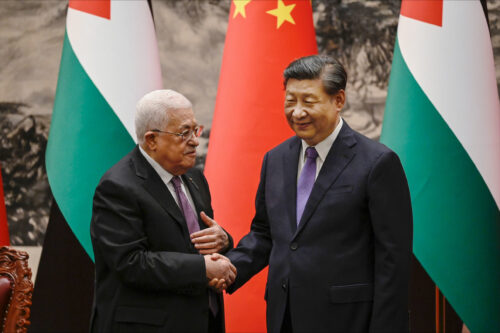‘The honeymoon is over’: Israel and China at 30 years
In the years before Trump, the China-Israel relationship was at its closest. But U.S. officials have recently warned against potential security threats. Where will China-Israel cooperation go from here?

As countries in the West have grown increasingly distant from China in recent years amid the pandemic and disputes over issues like Xinjiang, Hong Kong, and Taiwan, Israel has continued to pursue a close relationship with the PRC.
China is Israel’s third-largest trading partner. In 2021, China surpassed the U.S. as Israel’s largest source of imports at $10.7 billion that year, up from $7.7 billion the year before. In April, Israel added the Chinese yuan to its central bank reserves for the first time while trimming U.S. dollar and euro holdings in an attempt to diversify its foreign reserves. A free trade agreement, which has been in discussion for several years, is expected to go into effect by the end of this year.
As the two countries observe 30 years of diplomatic relations this year, Chinese state media has been celebrating the “flourishing” relationship. “Cooperation won’t be affected by external interferences,” the Global Times noted in January. But as China continues to distance itself from much of the world, and as U.S. pressure mounts on Israel to adopt a China policy more closely aligned with its own, the “honeymoon” between Israel and China may be coming to an end.
American warnings
U.S. security officials are concerned about the potential security threat presented by large infrastructure investments and technology transfers that could benefit China’s military. Last month, when Israel rejected an offer from a group of Israeli and Chinese companies for the construction of a light rail project, those companies filed suit, blaming “illegal” pressure from the United States. A new Chinese-operated Haifa Bayport Terminal — the site of Israel’s nuclear submarine force and a site regularly visited by the U.S. Sixth Fleet — is a major flashpoint that observers and both U.S. and Israeli officials have worried could one day result in a diplomatic crisis.
While the Israelis are aware of potential threats, officials and foreign policy experts believe America’s warnings are exaggerated.
“The U.S. opens its eyes in the morning and sees China,” says Alexander Pevzner, a senior researcher with Strategy Risks, which assesses financial and political risks for foreign companies that want to do business with China. “For Israel, China is not a similar threat. China is not an enemy to Israel and we do not want to make China an enemy.”
As Israel and China have become increasingly economically linked, reports have suggested that Israel will one day have to choose between the two superpowers. As it stands, it’s hard to imagine Israel turning its back on the U.S., which has played a major role in Israel’s dealings with China as early as the state’s founding.
Early relationship
Israel formally recognized the People’s Republic of China in 1950, only the seventh non-communist country — and the first in the Middle East — to do so. But barriers between the two remained firm. China’s foreign policy at the time focused largely on “third-world countries” in the Arab world; it provided aid to the Palestinian Liberation Organization while maintaining strong anti-Israel rhetoric. At the same time, the U.S. discouraged Israel from attempting to establish diplomatic ties with the PRC against the backdrop of the Korean War.
But by the 1970s, regional tensions had cooled, and China and Israel began establishing informal ties and a trade relationship. In 1992, the two officially opened representative offices in Tel Aviv and Beijing. It was a long time coming: Israel was the last Middle Eastern country to establish diplomatic relations.
The early days of cooperation — though this was also true before official diplomatic relations — focused on defense technology exchanges totaling between $1 and $2 billion over two decades. But following U.S. intervention in two crises related to Israeli upgrades and sales of military technology to the PRC — the Phalcon crisis in 2000 and the Harpy incident in 2005 — Israel put an end to its defense relations with China and implemented an export control law, which placed restrictions on arms and dual-use technology exports.
While Israeli officials at the time agreed that this compromise was necessary, the crises represented “a major setback” to the relationship, Pevzner says.
As the economic relationship has expanded over the years, Israeli officials have expressed interest in easing those restrictions and resuming military ties with China. In 2011, high-level military visits resumed as officials on both sides agreed that military cooperation should be strengthened, a prospect that continues to worry the U.S.
Strengthening of economic ties
In the early 2010s, the China-Israel relationship changed: with military cooperation no longer an option, economic cooperation flourished. Innovation centers and parks, educational institutions, think tanks, and infrastructure projects took off as dual investment soared.
What prompted this? With the newly unveiled Belt and Road Initiative (BRI) and a greater national focus on expanding innovation and technology, Israel’s Silicon Wadi attracted China’s attention. Meanwhile, in Israel, President Barack Obama was deeply unpopular, and Prime Minister Benjamin Netanyahu began looking beyond the U.S. and other Western allies for economic opportunities.
The following years were marked by numerous bilateral visits by high-profile leaders and the 2014 establishment of the China-Israel Joint Committee on Innovation and Cooperation, which meets annually and is currently chaired by Chinese Vice President Wáng Qíshān 王岐山 and Israel’s foreign minister Yair Lapid. After a visit to China in 2017 in which Netanyahu and Xi Jinping agreed on a “comprehensive innovation partnership,” Netanyahu called the relationship “a match made in heaven.” The agreement secured Israel’s spot as an important node in China’s BRI.
The relationship only improved in the following years, with bilateral trade peaking in 2018 at $11.6 billion as Netanyahu’s administration continued to prioritize its relationship with China despite America’s growing displeasure.
But pressure from the U.S. became more pronounced after President Donald Trump’s trade war with China. The U.S. expected Israel to follow its example, especially regarding exchanges of sensitive technologies. In April 2020, then-Secretary of State Mike Pompeo made an unprecedented surprise trip amid the escalating COVID-19 crisis, in which he asked Netanyahu to cool its relations with China and limit Chinese investments.
Similar pressure has continued under the Biden administration. CIA director William Burns visited Jerusalem in August, and national security advisor Jake Sullivan followed up in December.
Security experts like Assaf Orion, a senior researcher at Israel’s Institute for National Security Studies (INSS), where he heads the Israel-China program, say Israel should continue to pursue a beneficial economic relationship with China. But Israel has reason to remain wary of the relationship so it can maintain its own national security and strike the right balance with its closest strategic ally, the United States.
“Israel needs to learn from what other nations report of national security challenges: issues of dependency, influence, espionage, cyber threats…[but they] don’t add up to making China our enemy. It’s not,” says Assaf Orion, a senior researcher at Israel’s Institute for National Security Studies (INSS), where he heads the Israel-China program.
“The whole landscape has changed”
Ilan Maor says he is no longer able to conduct business with China like he used to. After several years working in diplomatic offices in Taiwan, Shanghai, and Jerusalem, he pivoted to business and is now a managing partner with the investment group Sheng Enterprises.
He describes the “special” Israel-China relationship as one full of warmth and respect between two peoples with long histories and shared values that have resulted in great economic gain on both sides.
But “aggressive” U.S. interference has gotten in the way, he says. “There are some opportunities that we had to lose or give up because we knew that trying to get it done would be very complicated, because of America’s positioning.”
The new Israeli administration, led by prime minister Naftali Bennett, has taken a few steps back from China in an effort to strike the right balance between China and the United States, including pledging to keep the U.S. informed on major deals with the PRC. Prior to Bennet’s tenure, in 2019, Israel established an investment oversight committee that analysts have said only exists to placate U.S. worries.
While some Israeli businesses and investors have seen the growing U.S. distance from China as a greater opportunity for Israeli companies, recent U.S. intervention has left a noticeable impact. Chinese investment in Israeli tech peaked in 2018 at 72 deals before falling into a sharp decline, with only 45 deals in 2020. Changes within the PRC, like new regulations on outbound investments and limits placed on business travelers, have also made a significant impact.
U.S. interference is one of the biggest challenges in China-Israel cooperation today, says She Gangzheng, an associate professor of international relations at Tsinghua University.
“China is not sure if Israel will have the intention to fully listen to the United States and scrutinize Chinese investment,” he says. “So that may cast out many future investments on the Chinese side.”
Put another way, “I think the honeymoon is over” between China and Israel, Orion says. “I think we have [with China], like [with] America, long-term relations. The day-to-day toil of a relationship. No illusions. No great falling in love, no hate, no animosity, but quite a few concerns on different things.”






